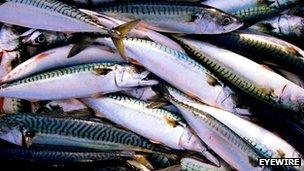UK claims breakthrough in fish dumping talks
- Published

The ban will cover the dumping of pelagic fish, such mackerel
The UK says it has agreed new laws with the European Union over the controversial dumping of unwanted fish.
Fisheries minister Richard Benyon said the "reforms" would make discards "a thing of the past".
But green groups were less upbeat, saying the European Parliament's plans on fishing reform were more ambitious.
After marathon talks, EU fisheries ministers agreed on a reform package , externalincluding a ban on dumping pelagic fish, such as mackerel and herring.
Mr Benyon said the next step was for the European Parliament to agree on the measures.
Ministers and MEPs have been negotiating a major overhaul of the Common Fisheries Policy (CFP) for three years.
The night-long negotiations ended early on Wednesday, with only Sweden voting against the measures.
'Step forward'
Barrie Deas, chief executive of the National Federation of Fishermen's Organisations (NFFO), said: "It is an important step forward as we near the end game - unless parliament throws any new obstacles, the final package should be along the lines agreed."
Once finalised by the European Parliament, a ban on dumping will be introduced on 1 January 2015 for pelagic fish - fish that live near the surface, rather than in deep water.
The ban was originally planned to be enforced in January 2014 but was put back a year.
Mr Benyon said: "This was a difficult negotiation, and although it is not as ambitious as I would have liked, we have stuck to our key principles."
Mr Deas said the delay was for "logistical reasons", adding that it would be "a point of relief for the industry" who will have more time to adapt.
The issue of discarding fish to avoid breaching quotas galvanised UK support when celebrity chef Hugh Fearnley-Whittingstall launched a Discards Campaign, which has so far attracted nearly 860,000 supporters.
Conservation campaign group Oceana said ministers had made "progress" but had "delivered a compromise that does not match the ambition of the parliament and is not enough to restore stocks".
And the environmental group WWF said ministers had "decided on a legally neutral text with few binding timelines and concrete measures". It contrasted with the parliament's "ambitious" reform, which called for fixed timelines and enforceability, WWF said.
'Key reform'
Mr Deas said that the "key to a reformed CFP" will be the new rules on regionalisation.
He said he was "very pleased" that ministers have made provisions to decentralise decision-making from Brussels.
Fisheries, which are commercial fish catching areas, will still be subject to EU law but decisions will be able to be taken at a regional level. Currently, all member states need to be consulted.
Scotland's Fisheries Secretary Richard Lochhead has described the changes agreed as a "significant step forward".
He said: "For decades we have fought to bring more control over our fishing sector out of Brussels to local fisheries."
The new laws will also set legally binding limits to ensure sustainable fishing levels, with annual quotas underpinned by scientific advice.
Mr Deas said that there were "concerns" that this point may be challenged by the European Parliament.
"Even scientists sometimes find it difficult to count the number of fish in the sea," he said. The European Parliament is under pressure from green activists who want hard biomass targets, which measure the largest maximum sustainable yield (MSY) - or largest catch - by weight.
However, ministers have agreed to go by the fish mortality MSY, which measures the number of fish.
Mr Benyon said: "We have worked hard on these negotiations, and I hope that parliament supports our agreement and brings negotiations to a swift conclusion. The wait is nearly over.".
"I came here to secure an agreement that would be good for the UK and to head off those who sought to water down the changes we desperately need to make to this broken policy," he said.
- Published15 May 2013
- Published6 February 2013
- Published6 February 2013
- Published27 February 2013